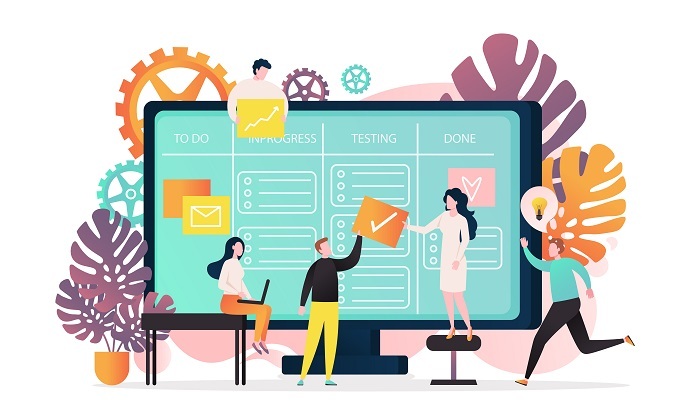
 Data Structure
Data Structure Networking
Networking RDBMS
RDBMS Operating System
Operating System Java
Java MS Excel
MS Excel iOS
iOS HTML
HTML CSS
CSS Android
Android Python
Python C Programming
C Programming C++
C++ C#
C# MongoDB
MongoDB MySQL
MySQL Javascript
Javascript PHP
PHP
- Selected Reading
- UPSC IAS Exams Notes
- Developer's Best Practices
- Questions and Answers
- Effective Resume Writing
- HR Interview Questions
- Computer Glossary
- Who is Who
Effective Project Management Methods that Will Work Best in 2023
It's possible that new approaches, technology, and trends that have recently evolved will be incorporated into the definition of project management in 2023.
Listed below are a few scenarios in which the definition of project management might alter in 2023
Increased emphasis on digitalization ? As technology develops, project management will probably become more digital. This may involve using automation, AI, and big data analytics to boost productivity and decision-making.
An increased focus on remote work ? As more businesses adopt rules for remote work, project management will need to change to successfully manage remote teams. This can involve utilizing online resources and platforms to help team members communicate and work together.
Project management may place more focus on sustainability and social effect as businesses become more aware of how their actions affect the environment and the general public. This can involve taking social and environmental factors into account while planning and carrying out projects.
Stakeholder management will be more crucial than ever due to the complexity of projects as they grow in size and scope. Strategies to include and communicate with stakeholders at all stages of the project's lifetime must be included in effective project management.
Greater integration ? Project management will be better connected with other corporate departments including operations, finance, and marketing.
Focus on resilience and adaptation ? As the world grows increasingly unpredictable, project management must put more emphasis on incorporating resilience and flexibility into the planning and execution of projects. Incorporating agile approaches, risk management, and scenario planning are some examples of this.
It is expected that by 2023, the definition of project management will have changed to take into account new innovations in technologies, methodologies, and trends that are intended to increase productivity, adapt to changing conditions and have a positive effect on society and the environment.
Effective Project Management Key Components
Project goals and Objectives ? To make sure that everyone participating in the project is working toward the same end goal, it is important to establish clear and realistic project goals and objectives.
Project Plan ? Creating a thorough project plan entails setting up a timeline, specifying duties, and determining the resources required to finish the project.
Managing risks and Issues ? A crucial part of project management is identifying possible difficulties and creating plans to address them.
Monitoring Progress and Performance ? Keeping tabs on progress and performance enables you to see problems as they arise and make the required corrections to keep the project on track.
Effective Communication ? Effective communication is crucial to the success of any endeavor. This involves updating stakeholders on project developments and any adjustments.
Project Resources ? Organizing and controlling project resources, such as personnel, funds, and supplies.
Continuous Improvement ? Constantly looking for methods to make project processes better while taking experience into account.
Ensuring that a project is finished on schedule, within budget, and to the satisfaction of all stakeholders is the overall goal of successful project management.
Project Management Methods for 2023

The most efficient project management strategies in 2023 will probably combine both conventional and cutting-edge approaches. Here are a few illustrations of project management techniques that should be very successful in 2023 ?
Agile Methodology ? Agile project management emphasizes flexibility and adaptation, making it suitable for workplaces that are quick-paced and continuously changing. Scrum and Kanban are two examples of agile approaches that are gaining popularity, especially in projects involving software development.
Hybrid Approach ? A hybrid approach includes aspects of both conventional and cutting-edge project management techniques, such as Waterfall and Agile. This enables teams to benefit from both methods' advantages, such as the formal planning offered by Waterfall and the adaptability of Agile.
Remote Project Management ? Project management from a distance will become more crucial than ever as a result of the ongoing epidemic and the increase in businesses adopting remote working practices. In order to ensure good communication and cooperation among team members, tools like project management software, video conferencing, and instant messaging will be extremely important.
Artificial Intelligence and Machine Learning ? Artificial intelligence (AI) and machine learning (ML): ML and AI have the potential to significantly impact project management by automating repetitive processes, such as data analysis, and project result prediction. Informed judgments may be made by project managers because of this.
Stakeholder Management ? Managing stakeholders is crucial to a project's success. The PMO should create a stakeholder management strategy that outlines all of the stakeholders, their responsibilities, and the routes for communication. This promotes accountability, openness, and trust-building among all parties involved.
Scrum ? Scrum is the most widely used framework in the Agile approach. Through a series of brief development cycles known as "sprints," the project goal is defined.
How it works ? Teams modify the high-level scope over iterations, which is how it works. Teams decide how many things they can commit to at the beginning of the sprint and produce a sprint backlog (a list of the tasks to perform during the sprint).
Why it works ? Through these revisions, the probability that a product will be delivered that completely fulfills client needs increases. Additionally, they can offer a marketable product sooner than using more conventional approaches, which is helpful for firms when speed-to-market is essential.
In general, the capacity to adapt to changing conditions and apply the proper tools and procedures to accomplish project goals will be the key to good project management in 2023.
Major Factors While Selecting Project Management Methodology
Before selecting any project management technique, take into account the following ?
The sector you work in
Project schedule
Project budget
The project's intricacy
Resources needed
Stakeholder necessity
Company competences
How Do You Select the Best Project Management Approach?

Let's now examine how you may make the decision to choose the finest project management approach ?
Determine the factors that are crucial to your project.
Identify the metrics that the technique will have an impact on.
Compared to each project variable, compare project management approaches.
Examine the risk factor and procedures of each technique in relation to your project to see which is the best match.
Join your team in this choice; don't go it alone.
Put the methodology into practice correctly.
Always choose the appropriate tool for the job. Methodologies for project management should be taken seriously.
Conclusion
In conclusion, an essential part of efficient project management is the project management methodology. It offers a structure for effectively and systematically organizing, planning, and carrying out tasks. Project management approaches come in a variety of forms, including Waterfall, Agile, Scrum, Kanban, and Lean. Every technique has its own advantages and disadvantages, and the best option will be determined by the particular requirements of the project.
A hybrid technique, which integrates components of many approaches, is expected to become increasingly common in 2023. Teams may thus benefit from the rigid planning of Waterfall and the adaptability of Agile, as well as other advantages of both methodologies. Additionally, a key part of the project management technique will be played by the use of digital tools, AI and machine learning, remote working, sustainability, stakeholder management, and flexibility.
Choosing the strategy that best suits the project's goals, objectives, restrictions, and risks is ultimately the key to an effective project management methodology. Success also depends on always looking for ways to make project procedures better and picking up experience-based knowledge.

